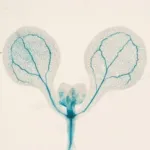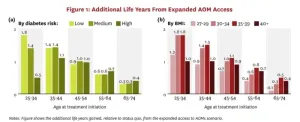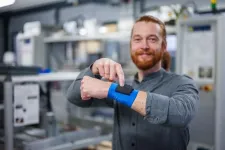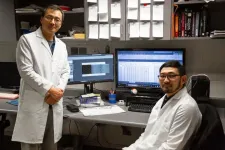(Press-News.org) Anthrax, an infectious disease caused by the bacterium Bacillus anthracis, is often treatable in its early stages. But once the disease has progressed beyond the “point of no return” after just a few days, patients are almost certainly doomed.
In a new Nature Microbiology study, University of Pittsburgh researchers show that a cocktail of growth factors reversed would-be lethal cell damage in mice with anthrax, suggesting that this approach could be adapted for use in patients beyond the brink.
“While only a few people die from anthrax in the United States each year, there is always the concern that the bacterium could be released on a large scale as a bioweapon,” said senior author Shihui Liu, M.D., Ph.D., associate professor of medicine at the Pitt School of Medicine and member of the Aging Institute, a joint venture of Pitt and UPMC. “Because the early symptoms of anthrax are non-specific and flu-like, the disease often isn’t diagnosed until it’s too late for current treatments to help. We need new approaches to treat this later stage of the disease.”
When B. anthracis enters the body through inhalation, ingestion, injection or contact with skin, it produces two proteins that combine to form lethal toxin.
Early on, anthrax can be treated with antibiotics that eliminate the bacterium or antibodies that neutralize lethal toxin before it enters cells. But once inside cells, the toxin inactivates members of a group of enzymes known as MEKs by cleaving off one of their ends, disrupting the important pathways they control and rapidly causing widespread cellular, tissue and organ damage—and death.
To learn more about the roles of MEK-controlled pathways in anthrax toxicity, Liu and his team generated mice with modified MEKs that were resistant to being cleaved by lethal toxin. These included MEK1 and MEK2, which control a pathway called ERK involved in cellular division and survival, and MEK3 and MEK6, which regulate the p38 pathway that’s involved in stress-induced defense.
When exposed to lethal toxin or B. anthracis, mice with either modified MEK1/2 or MEK3/6 had much greater survival than normal animals, indicating that anthrax must inactivate both the ERK and p38 pathways to kill its host.
In mice and human cells exposed to lethal toxin or B. anthracis, a combination of three growth factors —all individually approved as treatments for other conditions — reactivated the ERK pathway and brought them back from the point of no return.
“Because lethal toxin breaks MEK proteins by clipping off their ends, we thought that this cellular damage was irreversible,” said Liu. “So we were really surprised to find that specific growth factors were able to reactivate the ERK pathway and rescue the cell.”
Because different types of cells in the body may require different growth factors to activate ERK, the researchers are now working to optimize a treatment for anthrax in humans.
Other authors on the study were Jie Liu, Ph.D., Zehua Zuo, Ph.D., Michael Ewing, Qing Cao, M.S., Qi Li, M.D., Ph.D., and Toren Finkel, M.D., Ph.D., all of Pitt and UPMC; Liu Cao, M.D., Ph.D., of China Medical University; and Stephen H. Leppla, Ph.D., of the National Institute of Allergy and Infectious Diseases (NIAID).
This research was supported by NIAID (R01AI170574).
END
New approach could treat anthrax beyond the “point of no return”
2025-03-28
ELSE PRESS RELEASES FROM THIS DATE:
Those constantly distracted by their phone will just find other ways to procrastinate if it isn’t nearby
2025-03-28
If you just put away your phone to read this, chances are you’re not alone. Our phones are an endless source of distraction, and we interact with them every four to six minutes. This is often driven by habit as well as notifications, leading to a disrupted flow of activity while we’re trying to be productive.
A new study published in Frontiers in Computer Science investigated if placing smartphones just out of our reach while we’re at work influenced device use for activities not related ...
Ottoman Empire’s religious ‘tolerance’ another form of control
2025-03-28
Population surveillance. The carrying of identification while traveling. Add to that the public presence of diverse religions and it sounds like 2025, but this was life in the Ottoman Empire 200 years ago. Yet this seeming tolerance of non-Muslim faiths was in fact tied to the first two aspects, according to research by Osaka Metropolitan University Associate Professor Masayuki Ueno.
The Ottoman Empire lasted from around 1300 until 1922, and at various points in its history ruled present-day Turkey, Egypt, Greece, Hungary, and beyond. In the wake of the 1821 Greek revolt, the Ottoman Empire instituted ...
Smartphone bans alone fail to equip children for healthy use of technology
2025-03-27
Banning smartphone and social media access alone fails to equip children for healthy use of technology, argues a group of international experts in The BMJ today.
They say the focus should shift to a rights based approach, underpinned by age appropriate design and education, that protects children from harm while developing skills to help them participate in a digital society.
Bans on smartphone and social media access have been advocated in many countries to protect children from harm despite ...
Discovery of novel small compounds that delay flowering in plants
2025-03-27
Ikoma, Japan—In an era where climate change threatens food security, scientists worldwide are searching for reliable ways to improve crop production. Extreme weather and shifting seasonal patterns can disrupt traditional agricultural cycles, making technologies that regulate the timing of plant growth invaluable for farmers worldwide.
Plant growth and development are dependent on many factors such as the environment, photoperiod, and genetics. Flowering is an important event in a plant’s life ...
Expanding access to anti-obesity medications delivers 13% return on investment for society
2025-03-27
A new USC Schaeffer Center white paper finds expanded access to anti-obesity medications would lead to significant increases in life expectancy and disease-free years while generating a substantial societal return on investment, even after accounting for treatment costs.
More than 4 in 10 U.S. adults have obesity, which is linked to increased risk of over 200 diseases — including heart disease, diabetes, cancer and dementia — and costs society $260 billion annually to treat. Highly effective new anti-obesity medications can be a powerful tool against chronic disease, but fewer than one-third of health insurers cover them amid concerns about upfront ...
Genetic defense breakthrough: plants repurpose stomatal genes to fend off herbivores
2025-03-27
Ikoma, Japan—Throughout evolution, plants have continuously adapted to survive in changing environments. Apart from complex structural changes, plants have also developed various defense strategies against herbivores, including tougher protective layers, thorns, and chemical deterrents. Delving deeper into the evolution of defense mechanisms, a research team led by Assistant Professor Makoto Shirakawa from Nara Institute of Science and Technology (NAIST), identified a surprising genetic adaptation in the Brassicales plant order. In these cruciferous ...
David B. Allison, Ph.D., Daniel W. Belsky, Ph.D., and Arlan Richardson, Ph.D., to receive 2025 Scientific Awards of Distinction from the American Federation for Aging Research
2025-03-27
New York, NY — The American Federation for Aging Research (AFAR), is pleased to announce the 2025 recipients of three of its annual Scientific Awards of Distinction: David B. Allison, PhD, will receive the Irving S. Wright Award of Distinction; Daniel W. Belsky, PhD, will receive the Vincent Cristofalo Rising Star Award in Aging Research; and Arlan Richardson, PhD, will receive the George M. Martin Lifetime Achievement in Mentoring Award.
The Irving S. Wright Award of Distinction is named in honor of AFAR’s founder and recognizes exceptional contributions to basic ...
Pregnant women advised to avoid mentholated e-cigarettes
2025-03-27
RIVERSIDE, Calif. -- Vaping during pregnancy is becoming more common, but its impact on early human development is not well understood. A new study by scientists at the University of California, Riverside, now reports that the flavor chemical menthol used in electronic cigarettes could pose risks to a developing baby.
The study, published in STEM CELLS Translational Medicine, used human embryonic stem cells, or hESCs, to characterize early stages of embryonic development and examined how low concentrations of menthol affect important cellular processes.
The ...
Smart textiles and surfaces – How lightweight elastomer films are bringing tech to life
2025-03-27
Clothes that can mimic the feeling of being touched, touch displays that provide haptic feedback to users, or even ultralight loudspeakers. These are just some of the devices made possible using thin silicone films that can be precisely controlled so that they vibrate, flex, press or pull exactly as desired. And all done simply by applying an electrical voltage. The research teams at the Center for Mechatronics and Automation Technology in Saarbrücken (ZeMA) headed by Professors Stefan Seelecke and Paul Motzki (Saarland University) and John Heppe (htw saar – University of Applied Sciences ...
FAMU-FSU College of Engineering researchers create innovative microparticles that unlock new insights into protein degradation and immune cell behavior
2025-03-27
FAMU-FSU College of Engineering researchers have created a new method for studying protein degradation within immune cells that uses engineered microparticles to track and analyze degradation processes more effectively than traditional methods.
The work, which was published in ACS Applied Materials & Interfaces, has important implications for treating diseases such as cancer, Alzheimer’s disease and autoimmune disorders.
“There is a lot we still don’t know about how cells ingest and eliminate tissue debris or pathogens — the process ...






